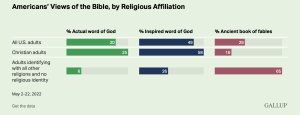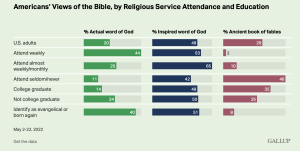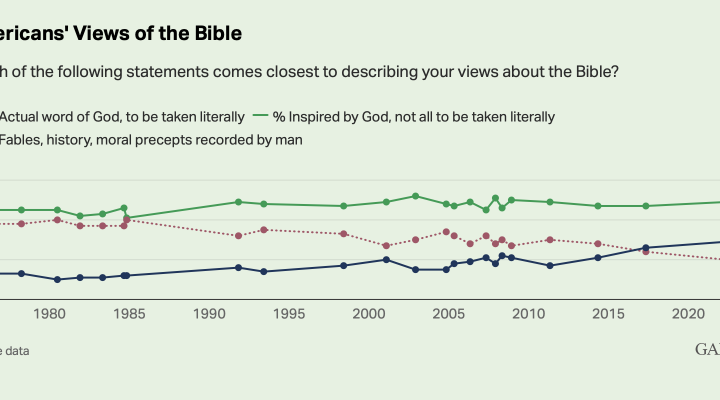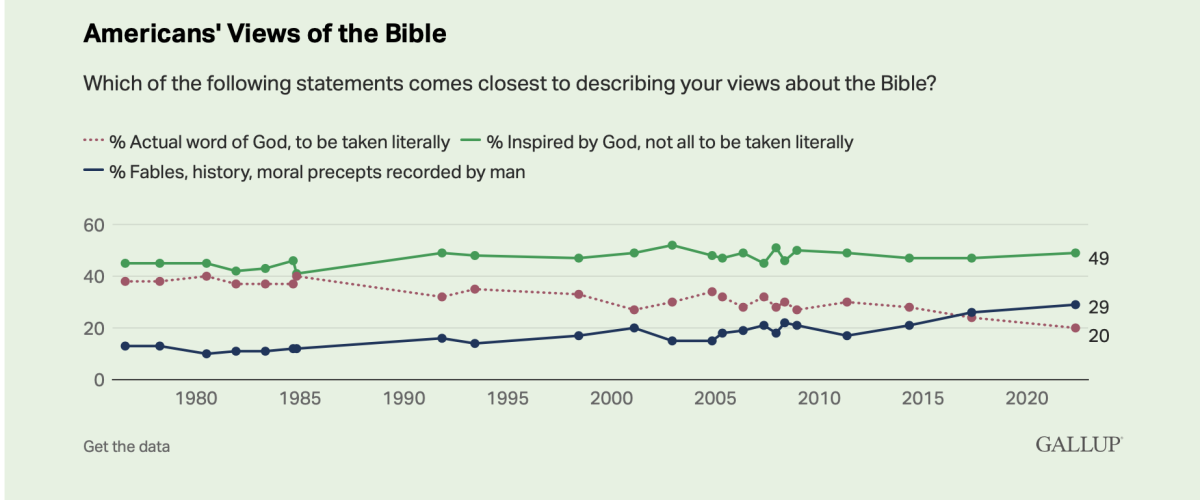While response to recent Supreme Court rulings on abortion, religious liberty and gun control have shown how widely out of step conservative evangelicals in America are from the rest of the population, there’s fresh data showing a similar gap on a more fundamental faith issue: The Bible itself.
Rulings from a new ultra-conservative majority on the high court this year have appealed most to evangelical Protestants and conservative Catholics by restricting abortion access, eschewing gun control and redefining religious liberty to favor free expression by Christians above others. Generally, religious conservatives embrace these social ideas because they also believe in a literal interpretation of the Bible.
But once again, the conservative evangelical view of the Bible — most hold that it is the literal and inerrant direct word of God — is not shared by 80% of the U.S. population. Only 20%, which is a record low, see the Bible as the literal word of God.
That’s down from 24% the last time the question was asked in 2017 and is half of the 40% rate recorded in 1980 and 1984.
This is not to say most Americans regard the Bible as fantasy, though. Still today, 49% say the Bible is inspired by God but is not always meant to be taken literally. That number has held relatively steady over time, except for a slight dip in 1984.
However, the share of Americans who believe the Bible is a collection of “fables, legends, history and moral precepts recorded by man” has been on the rise since 1980, when that view was held by only 10% of American adults. Today, that is the view of 29% of Americans.

Frank Newport of Gallup explained: “This marks the first time significantly more Americans have viewed the Bible as not divinely inspired than as the literal word of God.”
The middle view of the Bible — inspired but not literal — is commonly taught in mainline Christian and more progressive evangelical churches. Biblical inerrancy, which includes a more strictly literal reading of the Bible, is more commonly taught in conservative evangelical churches, including Southern Baptist congregations.
Among all Protestants, 30% today say the Bible is literally true, compared with 15% of Catholics. Nearly two-thirds of Catholics believe the Bible is the inspired word of God but that every word should not be taken literally.
Belief in a literal interpretation of the Bible is highest among those who are more religious and among those with less formal education, Newport said. “Americans who identify as evangelical or born again are much more likely than others to view the Bible as literally true, although even among this group, the percentage believing in a literal Bible is well less than 50%.”

The growth in those who do not believe the Bible is either divinely inspired or divinely dictated corresponds to a growing secularism in the country and decline in church attendance and membership.
“The shift in attitudes about the Bible is not an isolated phenomenon,” said Newport, whose father, John Newport, was a longtime professor at SBC seminaries in the second half of the 20th century. “It comes even as a number of indicators show a decline in overall religiosity in the U.S. adult population. These measures include declines in formal identification with a religion, self-reported membership in a church, self-reported religious service attendance, personal importance of religion, and a decline in belief in God. Thus, it is not surprising to find that views on the nature of the Bible have shifted in a less religious direction as well.”
Gallup’s general snapshot of American views of the Bible includes a sample of all people, encompassing both those who identify as Christian and those who do not as well as those who do not claim any religious affiliation at all.
These views of the Bible often translate to political and social views, Newport affirmed. “Americans’ interpretations of the Bible are important, because the Bible is often used as the basis for policy positions on moral and values issues, including such things as abortion and gay and lesbian relations. Some more conservative Protestant groups use a literal interpretation of passages from the New Testament as the basis for their belief that women should not be in positions of religious leadership in churches. Gallup’s data show that the use of a literal interpretation of the Bible as the basis or justification for social policy positions will likely resonate only with a declining minority of the overall U.S. population.”
Related articles:
How the Chicago Statement on Biblical Inerrancy became a litmus test | Analysis by Rick Pidcock
Why biblical inerrancy should be a litmus test | Analysis by David Bumgardner
Just because you believe the Bible ‘says it’ doesn’t ‘settle it’ | Opinion by Patrick Wilson


